

Second passports were once considered tools for those in politically or economically unstable nations. But today, the tides have shifted, and high-net-worth individuals (HNWIS) from some of the world’s most powerful and developed countries, including the United States, the United Kingdom, and Canada, are increasingly applying for second citizenships and residencies.
Elite movement in numbers
Data has confirmed this growing sentiment among the elite. A 2025 survey of Canadian millionaires reveals an ever-increasing desire to leave the country, with 28% more likely to emigrate than during the last federal election. The shift is primarily driven by concerns over declining quality of life (56%) and a negative economic outlook (45%). Interest in investment migration among Canada’s wealthy elite is rising sharply, with 56% of respondents expressing interest in Golden Visa programmes that offer residency or citizenship in exchange for investment.
In 2024, the UK was projected to lose a record 9,500 millionaires, more than doubling 2023 figures, as political instability and fears of higher taxes under a potential Labour government drive wealthy individuals abroad. The UK has also seen a net outflow of 16,500 millionaires since 2017, making it the second-largest loser of HNWIS in 2024 after China (15,200).
Americans have become the leading nationality applying for investment migration programmes, with 53% of U.S. millionaires, and a striking 64% of those aged 18 to 29, saying they are likely to leave the country after the 2024 election, regardless of who wins, according to a survey. A report by Al Jazeera also highlighted a surge in demand for second passports among U.S. citizens, with applications rising by up to 1,000% since 2020. In the first quarter of 2025 alone, there was a 400% increase compared to the previous year’s period. This sharp uptick reflects growing concerns about the country’s economic and political future.
What’s driving the elite to seek new passports?
The growing interest in investment migration among citizens who already possess strong travel privileges and global influence highlights a clear shift. An increasing number of elites from so-called superpower nations are now viewing second citizenship as a strategic hedge against domestic uncertainty, with investment costs ranging from USD 200,000 to several million. This trend is driven by a number of critical factors.
Political uncertainty, economic instability, and personal safety concerns drive a surge in demand for second passports among Americans, particularly following Donald Trump’s return to the presidency in 2025. Executive orders targeting transgender rights and immigration protections have alarmed vulnerable groups such as LGBTQ+ individuals and activists. One citizenship advisor reported nine applications in just seven days after a “gender ideology” order reversed trans protections. At the same time, fears of recession, inflation, and market volatility have led many to seek financial security abroad. Personal safety is another growing concern, especially among pro-Palestine protesters, minorities, and politically active individuals worried about surveillance or reprisals.
Second citizenship and Golden Visa programmes have become essential tools for high-net-worth individuals aiming to optimise their tax exposure, protect wealth, and enhance global financial flexibility. Caribbean CBI countries like St. Kitts and Nevis, Grenada, Antigua and Barbuda, Saint Lucia and Dominica offer desirable tax regimes, with no tax on foreign income, capital gains, or inheritance, enabling more efficient estate planning and legal tax diversification. Meanwhile, Portugal, Greece, and Malta have transformed their Golden Visa schemes into sophisticated strategies beyond residency, offering access to global markets, financial privacy, and wealth management advantages. As international tax scrutiny grows and many emerging markets impose capital movement restrictions, investors are increasingly turning to these programmes to access alternative banking, asset-backed lending, and to shield their assets from risks such as currency depreciation and regulatory volatility.
While U.S., Canadian, and EU passports are among the world’s most potent passports, they don’t always guarantee seamless access, particularly for long-term stays or travel to politically sensitive regions. A second passport from a Caribbean or European country can significantly enhance global mobility, reduce visa processing times, and offer greater flexibility for business, education, or lifestyle pursuits. For high-net-worth individuals with global operations or family abroad, dual citizenship simplifies travel logistics and supports a more agile international presence.
For many families, a second passport also serves as a safeguard for the future. Securing citizenship for spouses and children opens access to quality education, healthcare, and professional opportunities worldwide. In times of uncertainty, dual nationality provides critical peace of mind, ensuring that loved ones can thrive beyond the constraints of their home country. In fact, families consistently prioritise political stability, healthcare, and social infrastructure when selecting a destination, often placing these above tax benefits or cultural ties.
As global uncertainty grows, second citizenship and residency becomes less a luxury and more a strategic necessity. Even individuals in stable democracies face rising economic volatility, political shifts, and evolving tax policies.
For affluent families, securing a second passport provides a vital safety net, granting access to another country’s legal, financial, and healthcare systems and the freedom to relocate if needed. To explore the best options for your family, contact Citizenship Invest today.